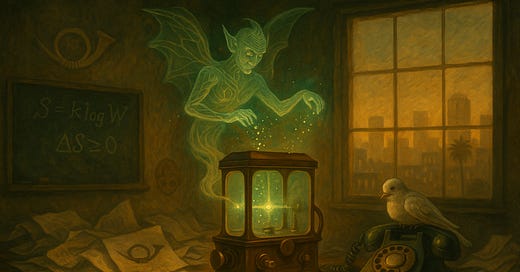"Each clue that comes is supposed to have its own clarity, its fine chances for permanence"
Thomas Pynchon's The Crying of Lot 49
Hello friends,
We recently completed The Crying of Lot 49 by Thomas Pynchon—a more contemporary text than we usually explore at the Mind on Fire Institute. We were searching for a bridge to the past and suspected Pynchon’s novel might serve as one. We were not mistaken.
Pynchon writes in a tradition that lies at the very heart of our inquiry. His novel is a densely woven tapestry of intertextual references—to historical figures, forgotten places, and cryptic events—all of which seem to guide the reader toward a destination just beyond reach. Rather than delivering a final revelation, Pynchon offers a foretaste: a glimmer of something immense, studded with offramps for those willing to follow the trail.
It was thrilling to find, in our own era, a prose master of the speculum literary style—a tradition Borges calls “a way of writing I learned from the poets,” that Dante (via Brunetto Latini) describes as a path to “live forever,” that Nietzsche names The Gay Science, and that was practiced by Goethe, Leopardi, and Emerson. These writers—and Pynchon among them—offer us maps through the literary underworld, where the dead still speak. They show how the past can teach the present, how dispersed meaning might be retrieved. Or, in Pynchon’s own idiom, how to reverse entropy.
I’d love to say more about this method in our upcoming sessions. For now, here is our July schedule. Most sessions are open, and you’re warmly invited to join us—just email mindonfireinstitute@gmail.com if you'd like to attend:
🔥 MOFI July Sessions
Wed, 7/2, 7:00 PM (EST): Aphorisms – MOFI 101 (open)
Tues, 7/8, 11:00 AM (EST): Lucretius’ On the Nature of Things, Book 3 (open)
Tues, 7/8, 6:00 PM (EST): Contemporary Science Fiction Seminar (closed)
Wed, 7/9, 7:00 PM (EST): Leo Szilard – On the Decrease of Entropy... (open)
Thurs, 7/10, 1:00 PM (EST): Emerson essays: Napoleon and Goethe (open)
Sat, 7/12, 11:00 AM (EST): Montaigne’s Essays, Book II, Essays 8–12 (open)
Tues, 7/15, 6:00 PM (EST): Creative Writing Workshop (closed)
Wed, 7/16, 7:00 PM (EST): Aphorisms – MOFI 101 (open)
Wed, 7/23, 7:00 PM (EST): Mary Bancroft – Autobiography of a Spy (Part 1 of 2) (open)
Sat, 7/26, 11:00 AM (EST): Pascal’s Pensées – “The Prophecies” (closed)
Thomas Pynchon’s The Crying of Lot 49
There are a few works that serve as beautiful entry points into the literary labyrinth we’re charting at MOFI. Dante’s Divine Comedy is one. Pynchon’s The Crying of Lot 49 is another.
The novel centers on Oedipa Maas, a California housewife in the 1960s, unexpectedly named co-executor of her ex-boyfriend’s estate. We learn little about Pierce Inverarity, except that he was a California real estate mogul with ties to the defense industry—possibly modeled on figures like Howard Hughes.
One of the novel’s central questions emerges early: Why me? Why is Oedipa, with no legal or financial training, chosen to untangle a vast and cryptic estate?
Her lawyer outlines the usual tasks—debts, assets, taxes—but then asks:
“Aren’t you even interested?”
“In what?”
“In what you might find out.”
And so begins a series of revelations.
The deeper Oedipa looks, the more she glimpses a hidden world—a shadow postal system called W.A.S.T.E., whose symbol is a muted post horn. It's used by people shut out from official communication channels—those seeking to speak and be heard without being seen or overheard. As Oedipa follows the trail, coincidences pile up until she can no longer tell whether they are coincidences.
By the end, four possibilities remain:
Everything is real.
She’s hallucinating it.
Pierce orchestrated a vast hoax.
She’s hallucinating that.
Pynchon doesn’t resolve the ambiguity. Instead, he plunges us into epistemological freefall. Is paranoia a kind of madness—or a deeper form of insight? Can we ever know the truth if the author (of the will, the text, or the universe) is absent?
The easiest answer is to say Oedipa is mad. But that ignores a striking fact: nearly every historical and scientific reference in the novel checks out. The 19th-century postal reforms? Real. The entropy–information theory link? Grounded in the work of physicist Leo Szilard, who described how Maxwell’s Demon could extract work from information—an idea eerily echoed by Pynchon’s fictional inventor, John Nefastis.
Szilard wasn’t just a theorist—he helped launch the Manhattan Project and was a close collaborator of Einstein. In other words, Pynchon is not merely spinning fiction. He appears to be pointing to something he can’t quite say directly.
Which brings us back to the central question:
What is Pynchon trying to tell us?
And do we have the tools to hear him?
At the Mind on Fire Institute, we believe we do.




